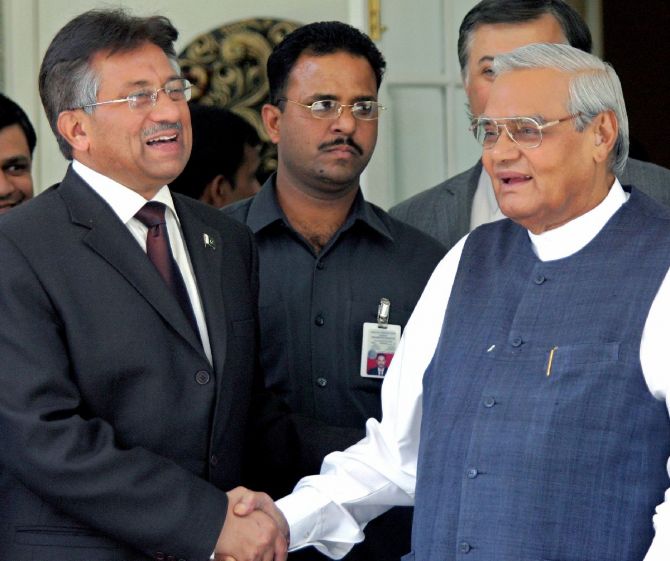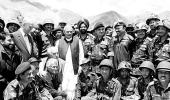'On the Kashmir and Pakistan question, it is startling that Vajpayee and Advani did more than anybody in Indian history.'

Was Prime Minister Atal Bihari Vajpayee's efforts to make peace with Pakistan thwarted by 'a more radical' L K Advani? Or were both of them working towards the same goal?
What made these two Hindutva stalwarts reach out to Pakistan again and again, despite the betrayal in Kargil?
And how is the outlook of Narendra Modi and Amit Shah on Pakistan different from that of Vajpayee-Advani?
In his book Jugalbandi: The BJP before Modi, author Vinay Sitapati argues that while both Vajpayee and Advani genuinely wanted peace with Pakistan and the settlement of Kashmir issue, their efforts could not succeed as Pakistan would not accept anything short of a "free Kashmir".
Whereas in Amit Shah's view, "The only solution is when India is strong and Pakistan is weak", Sitapati tells Rediff.com's Saisuresh Sivaswamy and strong>Syed Firdaus Ashraf in the fourth of a multi-part interview.
- Part 1: Why Modi-Shah must thank Advani-Vajpayee
- Part 2: You are looking today at Hindu Rashtra'
- Part 3: 'Had Modi been sacked in 2002, he would not have become PM'
Religious territory, your book mentions, is one of the three pillars of Hindu nationalism. So why have its practitioners failed to recover the territory lying with foreign forces, including Hinduism's holiest site, Kailash-Mansarovar?
(There are) two possible answers (to this) as I have heard this from the many people I have interviewed for this book.
They say territory is a religious one and not political one. Even Hinduism has this (theory) which is from Vishnupurana, written around the 4th century AD, of this idea of territory, of snowy mountains on top and oceans below.
And for many Hindus it is something that unites them, especially for someone in the Bharatiya Janata Party and Rashtriya Swayamsevak Sangh who look upon this as Bharat Mata. It is one aspect of their beliefs which has links with traditional Hinduism.
The second answer I feel is that they are lot more pragmatic than they give voice to. And their emphasis of 'Akhand Bharat' is much more with Pakistan than Kailash-Mansarovar.
When Vajpayee crosses the Wagah border and goes to Lahore, he gives a famous speech and only Vajpayee can pull this off.
He says words to the effect of, 'Look, many people are blaming me that by coming here I am putting a seal (of approval) on Pakistan's existence. And, I am saying Pakistan does not need the seal of anyone else.'
This is a brilliant line because everyone in Pakistan understands what he is trying to say.
He is trying to say that he is not interested in 'Akhand Bharat' and he says it in a style that the RSS does not get infuriated back home, and this is Vajpayee's genius.
Vajpayee himself was pushing back on the imagination of 'Akhand Bharat', but definitely this plays an imaginative role in RSS minds.
What happened in the Agra summit of 2001? How did the talks fail? Was Advani responsible for the failure?
No, I say the opposite of that. General (Pervez) Musharraf had this wrong view.
Advani and Vajpayee were the actors. One played the role of moderate, the other played the role of hardliner. Good cop, bad cop, if you will.
Musharraf bought it.
When the Agra summit failed, he said this and he said to Vajpayee there are forces above us, and he meant Advani and the RSS.
But, as I point out in the book, Advani pushed for the summit. Advani had so many secret meetings with the Pakistan high commissioner that led to the ground work for the meeting.
When the high commissioner was expelled, Advani hugged him and started crying. He is a soft man in that sense as he vents his emotions.
I don't buy this idea of Musharraf that Agra summit failed because of Advani.
The real reason the Agra summit failed was because the position of India and Pakistan on Kashmir are irreconcilable. Full stop.
There is no way to common ground there. Anything you give to Pakistan short of sovereignty of Kashmir is unacceptable to Pakistan. Anything nearing sovereignty is unacceptable to India.
I am saying Vajpayee did the most towards India-Pakistan peace. It is a fact that he was repeatedly rebuffed, yet he repeatedly did it.
Advani supported him 100 per cent, even when relations between them were terrible.
I think it was Advani's own way to exorcising the ghosts of Partition. As I mentioned, he comes from a very syncretic Sindhi community. It was his way of resting his ghosts.
In 2005, when Advani goes to his old school St Patrick's in Karachi, where they sing 'He is a Jolly Good Fellow', Advani starts crying.
And yet they fail. They even had talks with the Hurriyat who believes that a solution to Kashmir is outside the four corners of the Indian Constitution.
That is unacceptable to any political party of India. On the Kashmir and Pakistan question, it is startling that it was these two who did more than anybody in Indian history.
It is also a reality that they failed. And they failed despite their best efforts.
What drove Advani-Vajpayee into making this move on Kashmir and Pakistan?
I think, for Vajpayee, it was in a sense a way to mainstream the BJP. He thought that if you solve the Pakistan and Kashmir problem, it will end what separates the BJP from the rest of Parliament.
Vajpayee cared more about looking good in Parliament. It was his genuine belief that these were the ghosts that were bedevilling India.
And I think Advani was far more rational. He told the British high commissioner it is just as it took Nixon to make peace with China, it is only a right-wing party in India that can make peace with Pakistan because if the Congress does it, the BJP will cry foul.
It is remarkable and I have a whole chapter about this in the book.












 © 2025
© 2025